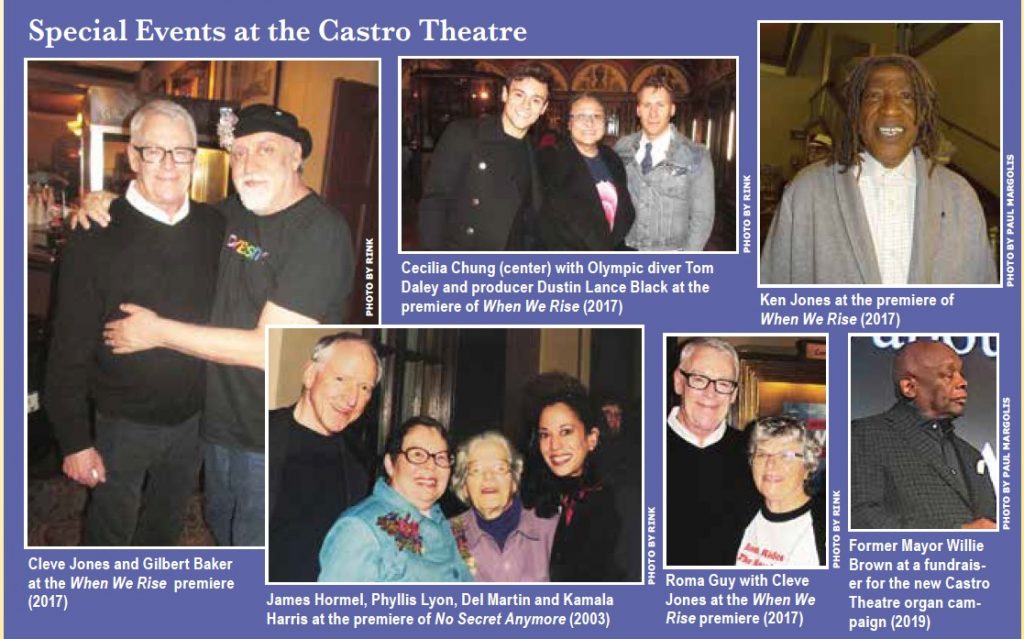
By Donna Sachet–
Show an image of the Eiffel Tower and immediately the city of Paris comes to mind. The clocktower of Big Ben evokes the city of London. The Statue of Liberty evokes the city of New York. Similarly, any depiction of the 100-year-old Castro Theatre suggests the neighborhood in which it stands, the epicenter of the LGBTQ+ Community the world over. More importantly, the Castro Theatre has served not just as a backdrop, but as the epicenter of a movement, a community, and a neighborhood. So, it is no wonder that the recent announcement that Another Planet will be taking over operations at the theatre venue has caused such a firestorm of public reaction.
The LGBTQ+ Community, as an organized entity with a recognized history, is adamant about protecting its symbols, fiercely fighting over which version of Gilber Baker’srainbow flag to raise, legislating legacy recognition of historic buildings like The Stonewall Inn in New York and Harvey Milk’s camera shop in San Francisco, and commemorating our historic figures with Rainbow Honor Walk bronze plaques in the Castro neighborhood sidewalks. So, it should come as no surprise that any news about the Castro Theatre would elicit protective instincts.
Many memories of the Castro are closely tied to this iconic theatre and its neon-blazing marquee, from Christmas Eve concerts with the SF Gay Men’s Chorus and celebrity-studded movie retrospectives with Marc Huestis to Rocket Dog Rescue fundraisers, drag queen roasts, and gala premieres of major Hollywood films, like MILK, Downton Abbey, and The Matrix.
But before the picket lines form and the raging editorials appear, let’s look at what last week’s press release from Another Planet says:
“Another Planet is honored to be part of and protect the irreplaceable heritage of the Castro Theatre. In the coming days, we’ll be meeting with local community groups who rightly love and have a stake in the Castro neighborhood and Castro Theatre. Movies will continue at the Castro. Frameline will continue at the Castro. Another Planet is adding to, not taking anything away from, the Castro Theatre and we look forward to being a collaborative partner with the ‘94114.’”
—Another Planet Entertainment
With a clear understanding of how public relations and skillful spins work, it is hard to find fault with the words in the aforementioned press release. “Another Planet is honored to be a part of and protect the irreplaceable heritage of the Castro Theatre,” “we’ll be meeting with local community groups,” and “we look forward to being a collaborative partner with the ‘94114.’” And yet, many of those who have benefited from the use of this sprawling venue in the heart of the Castro are looking for more guarantees of its continued availability, affordability, and neighborhood and community commitment.
Masood Samerie, President of Castro Merchants, has met with the theatre manager, owners, and new operator and expresses enthusiasm for the increased traffic and close community involvement they propose. Documentary filmmaker David Weissman has written to Another Planet expressing excitement about possibilities, but concern about the lack of specific mention in their press release of the impact of these changes on the LGBTQ+ Community.

The Castro Cultural Business District has gone so far as to congratulate Another Planet, but to suggest some very specific actions to calm community panic and to assure a smoother transition. In a January 20 detailed letter to Another Planet Entertainment and the Nasser Family that maintains ownership of the property, they emphasize the need to offer low-cost rental rates for nonprofit organizations, to hire personnel with “deep and broad knowledge of the LGBT Community,” to commit to upgrading the organ for which significant money has already been raised, and to continue the practice of repertory film screenings, among other things.
In order to meet with local community groups, to whom is Another Planet reaching out? Frameline Film Festival is specifically named in their press release, but what about other organizations and individuals with an ongoing connection to the theatre and the community, e.g. SF Gay Men’s Chorus, Silent Film Festival, Noir City Film Festival, Commonwealth Club, Imperial Court of San Francisco, Sisters of Perpetual Indulgence, Peaches Christ, D’Arcy Drollinger, and many others? Perhaps the Castro Cultural Business District is a good place to start, but smaller, independent players must not be left out of the equation.
Obviously, the telephones at Another Planet have been ringing constantly since their announcement and Greg Perloff, CEO of Another Planet Entertainment, is quick to point out success stories like Bill Graham Civic Auditorium and Fox Oakland Theater, where venues in danger of closure were revitalized, benefiting their surrounding neighborhoods.
The Nasser Family’s representatives have stated that their economic operations were not sufficient to fund the major physical and technical improvements that Another Planet plans to complete. Quotes in various publications are full of assurances that we will see a new and improved facility with wonderful new programming added to an established, respected, and valuable day-to-day operation. A rally planned in front of the theatre on Sunday, January 23, to protest many implied changes drew only meager attendance, but represents an undercurrent of dissatisfaction.
When one steps back from the hullabaloo for a moment, Another Planet’s plans may prevent what has become all too common across America. How many grand old theaters, after experiencing declining attendance, have been split into multi-screen venues, often with little regard for architectural beauty or community input? How many once treasured cinemas now stand vacant and often boarded up and graffiti scarred? How many beloved theaters have met the tragic fate of the Fox Theatre (San Francisco) movie palace, falling out of favor with the public, unable to generate sufficient sales volume, and tragically relegated to history by the wrecking ball?
No matter how you look at it, this is a turning point for the Castro Theatre and for a neighborhood hard hit by the COVID pandemic, declining retail sales and foot traffic, and skyrocketing costs of living. Will we see this international symbol of the LGBTQ+ Community and its modern struggle slowly erased from the landscape or will the Castro Theatre continue to offer rare repertory film screenings, quirky local events, neighborhood benefits, and be a cherished home for the LGBTQ+ population, while adding first-class experiences hitherto unavailable and injecting new life and vitality into its surroundings? Only time will tell.
Donna Sachet is a celebrated performer, fundraiser, activist, and philanthropist who has dedicated over two decades to the LGBTQ Community in San Francisco. Contact her at empsachet@gmail.com
Published on January 27, 2022
Recent Comments